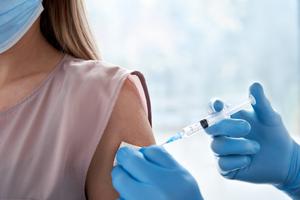Will Ethical COVID Vaccines Arrive at Warp Speed?
Promising ethical vaccines to fight COVID-19 have advanced to the later stages of testing.

WASHINGTON — More than 300 vaccines are currently in development to fight the coronavirus behind the COVID-19 pandemic and approximately 40 have already advanced to clinical trials — and among those, there are a number that are ethically derived without the use of any cell lines derived from tissues harvested from aborted babies.
The availability of morally acceptable coronavirus vaccines is a top priority for pro-life leaders, and for faithful Catholics. “My concern is that we have at least one choice that is ethically produced,” Dr. David Prentice, vice president and research director for the Charlotte Lozier Institute, told the Register.
According to The New York Times’ Coronavirus Vaccine Tracker, there are 27 vaccines worldwide in Phase 1 safety trials (small sets of people), 14 vaccines in Phase 2 (expanded trials involving hundreds of participants), and nine vaccines in Phase 3 efficacy trials, which involve thousands of participants and are necessary to catch potential adverse effects not caught in the smaller studies. The Times’ count captures vaccines that have combined Phase 1-2 or Phase 2-3 clinical trials.
In the vanguard of vaccine development in the U.S. are eight potential vaccines backed by the federal government’s Operation Warp Speed (OWS), a private-public partnership that has already spent $10 billion in an effort to bring a COVID-19 vaccine to the general public by 2021.
As these vaccines are brought rapidly through testing phases to production, the most significant ethical concern for Catholics has been striving to ensuring that any vaccines being produced have no complicity in abortion. Another significant issue is ensuring that vaccine trials are not compromised, in terms of their safety and effectiveness, by a rush to bring them prematurely to market.
The vaccines in Operation Warp Speed all rely on new technologies that allow them to be tested and come to production much earlier than traditional methods that developed vaccines from viruses cultivated in cell tissue. Prentice explained that unlike traditional methods of creating vaccines, the different methods utilized in Operation Warp Speed involve making proteins, not the whole virus, “like putting a face on a wanted poster … so if a virus does infect you the immune system is ready to slap it down.”
Ethically Derived Vaccines
While Prentice had confidence the FDA would only approve a COVID-19 vaccine if it were safe, that does not address the moral problem associated with vaccines that have utilized abortion-derived cell lines. The good news, Prentice explained, is that a majority of the OWS candidate vaccines meet the objective ethical criteria of not being produced with cell lines derived from the fetal tissue of aborted children.
One ethically-derived Operation Warp Speed COVID-19 vaccine advancing rapidly in Phase 3 is BioNTech-Pfizer’s BNT162 vaccine, which uses mRNA technology to provoke the body’s immune system to recognize and fight the virus. BioNTech-Pfizer has signaled it could have data ready for the Food and Drug Administration by the end of October, meaning approval could come by the end of 2020.
Another OWS participant, Moderna, is an mRNA vaccine which focuses its attention on a form of the Spike protein from SARS-CoV-2, the virus behind COVID-19. The company is also in Phase III, but is not expected to be ready until 2021.
Some other Operation Warp Speed possibilities also appear free from any direct involvement with cell lines derived from the fetal tissue of aborted children in their production.
Novavax, based in Maryland, is making a COVID-19 protein vaccine (NVX-CoV2373) based on its recombinant nanoparticle technology, which it used in developing its flu vaccine. According to a news release, Novavax is now in Phase 2 of its Phase 1/2 clinical trial.
Merck/IAVI uses recombinant vesicular stomatitis virus (rVSV) technology that mirrors Merck's Ebola virus vaccine, but the effort is still in preclinical development.
Sanofi/Glaxo-Smith-Kline is using the recombinant protein technology behind Sanofi’s FluBlok influenza vaccine in the fight against COVID, and GSK’s adjuvant technology which lowers the amount of vaccine protein needed in each dose. Sanofi/GSK has also started Phase 1 / 2 clinical trials with those results expected by December 2020.
Morally Problematic Candidates
At least two of the other leading vaccine candidates in Operation Warp Speed were developed from cell lines that are morally compromised because they are derived out of tissues taken from aborted children. Oxford University/Astra-Zeneca’s vaccine uses the HEK-293 line taken from a child aborted in 1972. Trials in the U.S. have been on hold since Sept. 6 when a participant developed a rare spinal inflammatory condition called transverse myelitis.
Janssen Research and Development (Johnson & Johnson) used the PER.C6 line, derived from an unborn child aborted in 1985, to develop its vaccine. That vaccine is expectedto begin Phase 3 trials in September.
Father Tadeusz Pacholczyk, director of education at the National Catholic Bioethics Center, noted that these lines are morally problematic because “valid informed consent was not obtained for the use of the child's cells, given that a mother automatically disqualifies herself from being able to give valid consent to use the child's remains whenever she intentionally and directly causes that child's death.”
He noted that, in the event that a person must use one of these vaccines, “A patient or ‘end user’ of such a vaccine does not commit any sin by receiving an inoculation.”
“But those who are involved in the research and manufacturing decisions are likely to have moral culpability for any decisions involving the use of these ethically-problematic cells,” he said.
These moral issues apply to a lesser degree with some of the other vaccines as well.
Moderna’s vaccine, for instance, is not produced from HEK-293 cells, but it has benefited from existing non-Moderna research on the Spike protein that used HEK-293 cells, and non-Moderna scientists have used these cells (in addition to ethically sourced cells) to test the vaccine.
Similar tests have been conducted by Novavax for its protein vaccine product, and BioNTech-Pfizer for its finished mRNA vaccine product.
Another similar concern is raised over Inovio Pharmaceuticals, which is a DNA-based vaccine that has nonetheless used the HEK-293 cell line in testing of its final product.
Despite these issues, Prentice said because all four of these vaccines are not directly produced from cell lines derived from aborted fetal tissue, people could take advantage of them with a clear conscience. And all four have been tested on ethically-derived cells as well.
“Again, I would have no ethical qualms taking that vaccine because there is nothing in its production that uses these illicit cell lines,” he said. But he said scientists should realize they are morally culpable for using abortion-derived cell lines to test their product, when there are other ethically-derived alternatives available for testing.
Father Pacholczyk said biomedical research needs to abandon all use of cell lines derived from the tissue of aborted children in favor of ethical alternatives.
“In my opinion, the government should not be providing public funding to companies that use cell lines from abortions in their vaccine development efforts,” he said.
Too Fast, Too Soon?
While some of the vaccines may prove to be ethical alternatives, there is an additional challenge with the unprecedented speed of the attempt to bring COVID-19 vaccines to market when time is needed to gather robust clinical data to understand the consequences of each vaccine.
“Trying quickly to develop a vaccine as a novel pandemic unfolds, and in the midst of enormous competitive pressures, doesn’t guarantee success,” Father Pacholczyk said. He noted that vaccine research and development is in uncharted territory as “no vaccine has ever been created in less than four years” and most have taken around a decade.
“We’re still in the early stages of the COVID-19 vaccine work, so it's difficult to identify the most promising candidate,” he said.
Debi Vinnedge, executive director of Children of God for Life, which campaigns against the use of fetal cells in any testing and research including with COVID-19 vaccines, told the Register that she is also concerned that “vaccines in development are being rushed to the market with an insufficient amount of time for testing.”
“We have no idea what sort of health risk this may cause long term or if it might affect younger people differently than the elderly,” she said.
USCCB Perspective
The U.S. Conference of Catholic Bishops (USCCB) Secretariat of Pro-Life Activities is hopeful that ethical vaccines will be available to patients and medical professionals, thereby avoiding a crisis of conscience that would complicate the pandemic response.
“If, however, the only COVID vaccine to cross the finish line is produced using aborted fetal cells, it would cause major conscience problems for many Catholic and pro-life individuals and, as a result, undermine public health,” Greg Schleppenbach, the Secretariat of Pro-Life Activities’ associate director, told the Register.
The Vatican has stated that, under certain circumstances (e.g. serious health risks to the population as a whole), Catholics can accept such vaccines in good conscience, so long as they make their objections known and lobby public officials to provide ethical replacements.
In the case of the coronavirus vaccine, the goal is to prevent that scenario from happening in the first place. Schleppenbach said his office has been asking Catholics to contact the U.S. Department of Health and Human Services and “demand a COVID-19 vaccine that is free from connection to abortion.”
Peter Jesserer Smith is a Register staff writer.
- Keywords:
- coronavirus
- coronavirus vaccine
- coronavirus vaccine abortion
- ethical vaccines
- peter jesserer smith
















